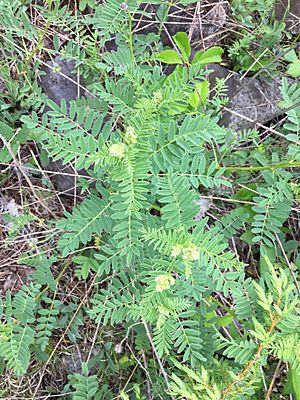Cooper's milkvetch facts for kids
Quick facts for kids Cooper's milkvetch |
|
|---|---|
 |
|
| Conservation status | |
| Scientific classification | |
| Genus: |
Astragalus
|
| Species: |
neglectus
|
| Synonyms | |
|
|
Cooper's Milkvetch, also known as Astragalus neglectus, is a type of flowering plant. It's part of the pea family, called Fabaceae. This plant grows naturally in the northeastern parts of North America.
Contents
What Does Cooper's Milkvetch Look Like?
Cooper's Milkvetch is a plant that comes back every year, so it's called a perennial. It's a soft, green plant that can grow from about 30 to 90 centimeters (about 1 to 3 feet) tall.
Its leaves grow in an "alternate" pattern along the stem. This means they don't grow directly opposite each other. Each leaf is "compound," which means it's made up of many smaller parts called leaflets. A single leaf usually has between 11 and 25 of these small leaflets.
The plant produces clusters of 10 to 20 white or creamy-colored flowers. These flower clusters grow from where the upper leaves meet the stem. After the flowers bloom, they turn into interesting, puffy seed pods.
How Did Cooper's Milkvetch Get Its Name?
The first time this plant was officially described was in 1838. It was called Phaca neglecta back then. Two scientists, John Torrey and Asa Gray, wrote about it in their book, A Flora of North America.
Later, in 1856, another scientist named Asa Gray described a similar plant. He named it Astragalus cooperi after a person named William Cooper, who found that plant. Eventually, scientists realized that Astragalus cooperi was actually the same plant as Astragalus neglectus. That's why it's often called Cooper's Milkvetch today.
Where Does Cooper's Milkvetch Grow?
Cooper's Milkvetch mostly grows around the Great Lakes region in North America. However, you can also find it in other places. Its range stretches from Manitoba in Canada and South Dakota in the United States, all the way east to Massachusetts and Virginia.
This plant is quite rare in most of the areas where it grows. It likes to live in open spaces that can be either wet or dry. It often grows in rocky areas, especially those with lots of calcium in the soil. For these open habitats to stay healthy, they need natural events like small fires or disturbances. These events help keep the area clear for the plant to thrive.
Why Is Cooper's Milkvetch Important to Protect?
Even though Cooper's Milkvetch is generally considered "apparently secure" globally (meaning it's not immediately at high risk worldwide), it's still a rare plant. In many of the states and provinces where it grows, it's seen as a potentially vulnerable species. This means it could be at risk of disappearing in those specific areas.
For example, in Wisconsin, Cooper's Milkvetch is listed as an endangered plant. This means it's in serious danger of dying out there. It used to be considered at risk in Minnesota too. But in the 1990s, many new groups of these plants were found, so it was removed from Minnesota's "at risk" list. Protecting plants like Cooper's Milkvetch helps keep our natural world diverse and healthy.
Images for kids




